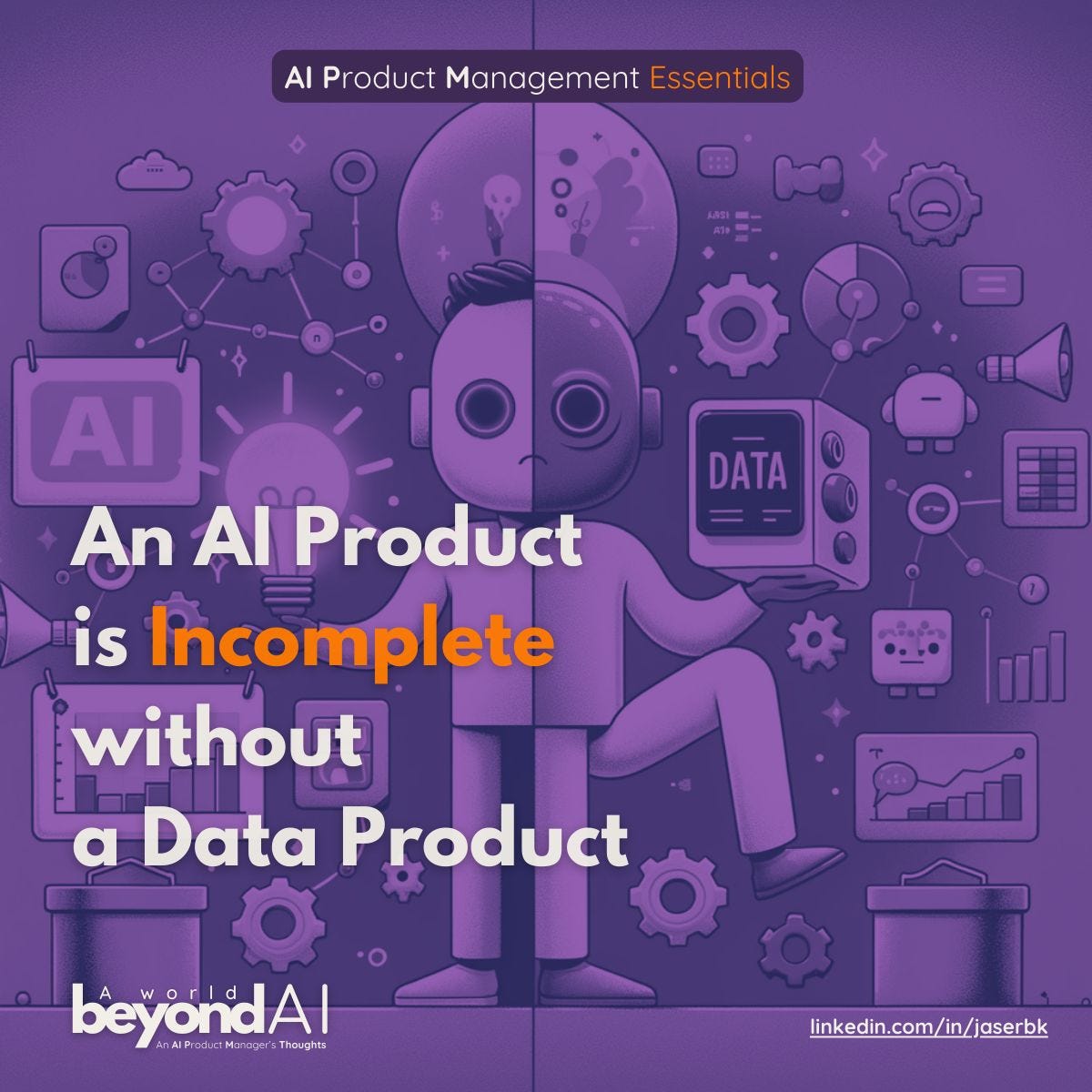AI Products are Incomplete without Data Products
AI Product Managers' Best Ally & the Chicken-Egg Dilemma
#beyondAI
AI products are typically part of a larger value chain. This means more components are necessary to develop a final, end-user-facing product. One of these components is a Data Product. As companies increasingly embrace AI Product Managers, they must also prioritize hiring Data Product Managers 💡. Behind every successful AI product is, at the very least, a robust Data Product enabling it.
The industry's increasing focus on AI Product Managers (AIPMs) underscores the importance of specialized roles in managing AI initiatives. However, it's equally important to highlight the role of Data Product Managers (DPMs).
What’s the Difference?
AI Product Managers primarily develop, deploy, and manage AI-based solutions. They work at the intersection of technology, business, and user experience, ensuring that AI products meet market needs and deliver value. AIPMs deal with challenges specific to AI, such as model interpretability, ethical considerations, continuous learning processes, and data acquisition & quality.
Here is where it becomes challenging and, at times, overwhelming for an AIPM to also cover those data aspects.
Data Product Managers play a vital role that complements the work of AIPMs. They are responsible for overseeing the lifecycle of a data product:
Data Quality and Governance 💡 Ensuring the data is accurate, consistent, and reliable. This is crucial as the quality of data directly impacts the performance of AI models.
Data Strategy and Architecture 📊 Defining how data is collected, stored, processed, and utilized. This involves understanding the technical aspects as well as the legal and ethical implications of data usage.
Data Accessibility and Democratization 🔗 Making data accessible to different stakeholders while ensuring security and compliance. This is key in organizations where cross-functional teams depend on data for decision-making.
Aligning Data with Business Goals 🎯 Ensuring that data initiatives align with broader business objectives. This involves understanding both the technical and commercial aspects of data.
The success of an AI product often depends on how well these two roles collaborate and align their strategies. Companies investing in AI should recognize the importance of both roles.
When to Onboard Data Product Managers?
Now, this is somewhat akin to the question: Which came first, the chicken or the egg? 🥚🐔
You can approach this question from an evolutionary standpoint, where the answer leans towards the egg. From a cultural or religious perspective, the answer tends to be that the chicken came first. Or from a philosophical perspective, where there isn’t a definitive answer 🤔.
Whether to have AI Product Managers first or Data Product Managers first really depends on the context we are in. In some scenarios, having a DPM makes sense first, and in others not.
But let's discuss this with two actual examples, assuming we are working in a company that has collected data over the years. Now comes the time when this company wants to create value from those data assets. They think about using AI to derive some value.
They start hiring, and the first hire is an AI Product Manager who should identify worthy AI use cases, which fit the data the company already has. The AIPM identifies several use cases and suggests working on those low-hanging fruits first, to quickly gain traction and validate the impact of AI. Now they form a team of data scientists, data engineers, and other relevant business experts to validate a first hypothesis.
It turns out that it’s a positive use case with monetary impact 💸, and all they need to do now is pay off the technical debt they have built up over time, operationalize the entire value stream, and make it production-ready.
And here is the point where the AIPM potentially can get overwhelmed with the workload that only the data aspects are bringing in. He suggests hiring a Data Product Manager to maintain the entire data stream and to onboard even more data for the AI product over time, overseeing the lifecycle of a data product as described above.
In another scenario, the same company decides to first start monetizing its data by creating a dataset so clean and neat that every single department can generate its own reports in days. It’s kind of obvious that here, we don’t need an AI Product Manager first.
So, you see, in this example, the correct answer depends on the company's strategy. So, in this case, it’s a highly philosophical approach 😉. You will never come to a definite answer, detached from the context.
But one thing we know for sure: The AI Product Manager's best ally is, and will forever ❤️ be, the Data Product Manager.
JBK 🕊️



